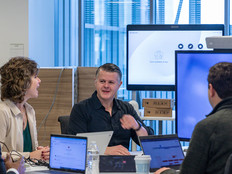Imagine Nation ELC 2018: How Agencies Are Spending TMF Money
The first three agencies to receive money from the new Technology Modernization Fund are in the early stages of upgrading legacy mainframes, email and a customer-facing website.
For the Department of Housing and Urban Development, the Energy Department and the Department of Agriculture, “this is a chance to talk about what was a twinkle in everyone’s eye and is now something that’s real and moving forward,” said Bill Zielinski, deputy assistant commissioner for category management at the General Services Administration.
Agencies can apply for money from the $100 million TMF, created earlier this year, to work on IT modernization projects. The projects must be able to be completed in a relatively short period of time, and the agencies must pay back the money.
HUD, USDA and Energy received a total of $45 million for their projects, which top officials outlined at the Imagine Nation ELC 2018 conference in Philadelphia. USDA and HUD are also the first two agencies to take part in the GSA’s Centers of Excellence program for IT modernization.
USDA Works to Expand Farmers.gov
USDA plans to spend $10 million building out its farmers.gov site, which allows farmers to efficiently connect with the agency online. The goal is to add more functions, including the ability to apply for farm loans and other similar programs without having to fill out duplicative paperwork.
“We want to make the experience for a producer to get a farm loan as seamless and electronic as possible,” said USDA CIO Gary Washington. This iteration of the website should roll out some time next year, he said.
At Energy, the goal for its $15 million allocation is to migrate the entire agency to Microsoft’s Office 365, said Denise Hill, a senior technical adviser in the CIO’s office. Some units already use Office 365, but the TMF money will pay for those that do not have the expense of migration covered in their budgets.
The agency currently has a number of different versions of email systems managed by different vendors with different naming conventions. “We do have difficulty contacting people across the enterprise depending on the system that they’re on,” she said.
At the moment, Department of Energy staff members are preparing for the migration process, working out as many details in advance as possible, including figuring out whether the agency will need to upgrade its network, she said.
MORE FROM FEDTECH: Find out how emerging technologies like drones and VR help agencies innovate!
HUD Plans to Take COBOL Out of the Equation
HUD’s $20 million will enable that agency to take critical financial systems off legacy technology so old that they are running on COBOL, said Kevin Cooke Jr., principal chief deputy CIO.
One of those functions is mortgage underwriting, which affects tens of millions of American homeowners — and that made it simpler to convince HUD employees used to the legacy hardware to get behind the upgrade.
“Part of our proposal was letting everyone in the room know that their data was at risk in that older system,” Cooke said.
Agency IT workers are testing code from one of the financial systems to make sure the platform change HUD is planning actually works, he added.
Members of the board that awarded the TMF money said they were particularly delighted by HUD’s proposal.
“They’re going to blaze the trail for multiple other agencies that have the challenge of COBOL code and mainframes as their primary base,” said Margaret Graves, the deputy federal CIO.
Read more articles and check out videos from FedTech’s coverage of Imagine Nation ELC 2018 here.









